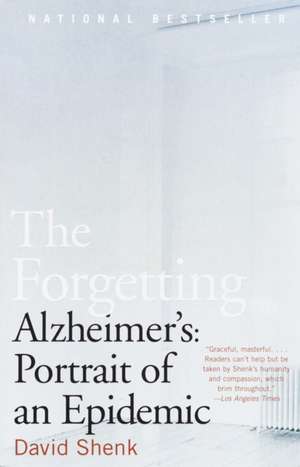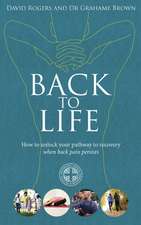The Forgetting: Portrait of an Epidemic
Autor David Shenken Limba Engleză Paperback – 31 dec 2002
The Forgetting is a scrupulously researched, multilayered analysis of Alzheimer’s and its social, medical, and spiritual implications. David Shenk presents us with much more than a detailed explanation of its causes and effects and the search for a cure. He movingly captures the disease’s impact on its victims and their families, and he looks back through history, explaining how Alzheimer’s most likely afflicted such figures as Jonathan Swift, Ralph Waldo Emerson,and William de Kooning. The result is a searing, powerfully engaging account of Alzheimer’s disease, offering a grim but sympathetic and ultimately encouraging portrait.
Preț: 111.92 lei
Nou
Puncte Express: 168
Preț estimativ în valută:
21.42€ • 23.28$ • 18.01£
21.42€ • 23.28$ • 18.01£
Carte disponibilă
Livrare economică 31 martie-14 aprilie
Preluare comenzi: 021 569.72.76
Specificații
ISBN-13: 9780385498388
ISBN-10: 0385498381
Pagini: 304
Dimensiuni: 133 x 206 x 17 mm
Greutate: 0.24 kg
Editura: Anchor Books
ISBN-10: 0385498381
Pagini: 304
Dimensiuni: 133 x 206 x 17 mm
Greutate: 0.24 kg
Editura: Anchor Books
Notă biografică
David Shenk is the author of three previous books, including Data Smog, which The New York Times hailed as an “indispensable guide to the big picture of technology’s cultural impact.” A former fellow at the Freedom Forum Media Studies Center at Columbia University, he has written for Harper’s, Wired, Salon, The New Republic, The Washington Post, and The New Yorker, and is an occasional commentator for NPR’s All Things Considered. He lives in Brooklyn, New York, with his wife and daughter.
Extras
Chapter 1
I Have Lost Myself
A healthy, mature human brain is roughly the size and shape of two adult fists, closed and pressed together at the knuckles. Weighing three pounds, it consists mainly of about a hundred billion nerve cells--neurons--linked to one another in about one hundred trillion separate pathways. It is by far the most complicated system known to exist in nature or civilization, a control center for the coordination of breathing, swallowing, pressure, pain, fear, arousal, sensory perception, muscular movement, abstract thought, identity, mood, and a varied suite of memories in a symphony that is partly predetermined and partly adaptable on the fly. The brain is so ridiculously complex, in fact, that in considering it in any depth one can only reasonably wonder why it works so well so much of the time.
Mostly, we don't think about it at all. We simply take this nearly silent, ludicrously powerful electrochemical engine for granted. We feed it, try not to smash it too hard against walls or windshields, and let it work its magic for us.
Only when it begins to fail in some way, only then are we surprised, devastated, and in awe.
On November 25, 1901, a fifty-one-year-old woman with no personal or family history of mental illness was admitted to a psychiatric hospital in Frankfurt, Germany, by her husband, who could no longer ignore or hide quirks and lapses that had overtaken her in recent months. First there were unexplainable bursts of anger, and then a strange series of memory problems. She became increasingly unable to locate things in her own home and began to make surprising mistakes in the kitchen. By the time she arrived at Stadtische Irrenanstalt, the Frankfurt Hospital for the Mentally Ill and Epileptics, her condition was as severe as it was curious. The attending doctor, senior physician Alois Alzheimer, began the new file with these notes in the old German Sutterlin script.
She sits on the bed with a helpless expression.
"What is your name?"
Auguste.
"Last name?"
Auguste.
"What is your husband's name?"
Auguste, I think.
"How long have you been here?"
(She seems to be trying to remember.)
Three weeks.
It was her second day in the hospital. Dr. Alzheimer, a thirty-seven-year-old neuropathologist and clinician from the small Bavarian village of Markbreit-am-Main, observed in his new patient a remarkable cluster of symptoms: severe disorientation, reduced comprehension, aphasia (language impairment), paranoia, hallucinations, and a short term memory so incapacitated that when he spoke her full-name, Frau Auguste D------, and asked her to write it down, the patient got only as far as "Frau" before needing the doctor to repeat the rest.
He spoke her name again. She wrote "Augu" and again stopped.
When Alzheimer prompted her a third time, she was able to write her entire first name and the initial "D" before finally giving up, telling the doctor, "I have lost myself."
Her condition did not improve. It became apparent that there was nothing that anyone at this or any other hospital could do for Frau D. except to insure her safety and try to keep her as clean and comfortable as possible for the rest of her days. Over the next four and a half years, she became increasingly disoriented, delusional, and incoherent. She was often hostile.
"Her gestures showed a complete helplessness," Alzheimer later noted in a published report. "She was disoriented as to time and place. From time to time she would state that she did not understand anything, that she felt confused and totally lost. Sometimes she considered the coming of the doctor as an official visit and apologized for not having finished her work, but other times she would start to yell out of the fear that the doctor wanted to operate on her [or] damage her woman's honor. From time to time she was completely delirious, dragging her blankets and sheets to and fro, calling for her husband and daughter, and seeming to have auditory hallucinations. Often she would scream for hours and hours in a horrible voice."
By November 1904, three and a half years into her illness, Auguste D. was bedridden, incontinent, and largely immobile. Occasionally, she busied herself with her bed clothes. Notes from October 1905 indicate that she had become permanently curled up in a fetal position, with her knees drawn up to her chest, muttering but unable to speak, and requiring assistance to be fed.
What was this strange disease that would take an otherwise healthy middle-aged woman and slowly--very slowly, as measured against most disease models--peel away, layer by layer, her ability to remember, to communicate her thoughts and finally to understand the world around her? What most struck Alzheimer, an experienced diagnostician, was that this condition could not fit neatly into any of the standard psychiatric boxes. The symptoms of Auguste D. did not present themselves as a case of acute delirium or the consequence of a stroke; both would have come on more suddenly. Nor was this the general paresis--mood changes, hyperactive reflexes, hallucinations--that can set in during the late stages of syphilis. She was clearly not a victim of dementia praecox (what we now call schizophrenia), or Parkinson's palsy, or
Friedreich's ataxia, or Huntington's disease, or Korsakoff's syndrome, or any of the other well-recognized neurological disorders of the day, disorders that Alzheimer routinely treated in his ward. One of the fundamental elements of diagnostic medicine has always been the exercise of exclusion, to systematically rule out whatever can be ruled out and then see what possibilities are left standing. But Alzheimer had nothing left.
What the fifty-one-year-old Auguste D.'s condition did strongly evoke was a well-known ailment among the elderly: a sharp unraveling of memory and mind that had, for more than five thousand years, been accepted by doctors and philosophers as a routine consequence of aging.
History is stacked with colorful, poignant accounts of the elderly behaving in strange ways before they die, losing connection with their memories and the world around them, making rash decisions, acting with the impetuousness and irresponsibility of children. Plato insisted that those suffering from "the influence of extreme old age" should be excused from the commission of the crimes of sacrilege, treachery, and treason. Cicero lamented the folly of "frivolous" old men. Homer, Aristotle, Maimonides, Chaucer, Thackeray, Boswell, Pope, and Swift all wrote of a distressing feebleness of mind that infected those of advancing years.
"Old age," wrote Roger Bacon, "is the home of forgetfulness."
Known as morosis in Greek, oblivio and dementia in Latin, dotage in Middle English, d*mence in French, and fatuity in eighteenth-century English, the condition was definitively termed senile dementia in 1838 by the French psychiatrist Jean ftienne Esquirol. In a depiction any doctor or caregiver would recognize today, Esquirol wrote: "Senile dementia is established slowly. It commences with enfeeblement of memory, particularly the memory of recent impressions."
But that was senile dementia. What was this? Alois Alzheimer wanted to know. Why did a fifty-one-year-old appear to be going senile? How could Auguste D. be suffering from the influence of extreme old age?
We are the sum of our memories. Everything we know, everything we perceive, every movement we make is shaped by them. "The truth is," Friedrich Nietzsche wrote, "that, in the process by which the human being, in thinking, reflecting, comparing, separating, and combining . . . inside that surrounding misty cloud a bright gleaming beam of light arises, only then, through the power of using the past for living and making history out of what has happened, does a person first become a person."
The Austrian psychiatrist Viktor Frankl made much the same point in Man's Search for Meaning, his memoir of experiences as a concentration camp inmate. Frankl recalled trying to lift the spirits of his fellow camp inmates on an especially awful day in Dachau: "I did not only talk of the future and the veil which was drawn over it. I also mentioned the past; all its joys, and how its light shone even in the present darkness. [I quoted] a poet . . . who had written, Was Du erlebst, kann keine Macht der Welt Dir rauben. (What you have experienced, no power on earth can take from you). Not only our experiences, but all we have done, whatever great thoughts we may have had and all we have suffered, all this is not lost, though it is past; we have brought it into being. Having been is a kind of being, and perhaps the surest kind."
Emerson was also fascinated by memory--how it worked, why it failed, the ways it shaped human consciousness. Memory, he offered about a decade or so before his own troubles first appeared, is "the cement, the bitumen, the matrix in which the other faculties are embedded . . . without it all life and thought were an unrelated succession." While he constructed an elaborate external memory system in topical notebooks, filling thousands of pages of facts and observations that were intricately cross-referenced and indexed, Emerson was also known for his own keen internal memory. He could recite by heart all of Milton's "Lycidas" and much of Wordsworth, and made it a regular practice to recite poetry to his children on their walks. His journal entries depict an enchantment with the memory feats of others.
He kept a list:
Frederic the Great knew every bottle in his cellar. Magliabecchi wrote off his book from memory. Seneca could say 2,000 words in one hearing. L. Scipio knew the name of every man in Rome. Judge Parsons knew all his dockets next year. Themistocles knew the names of all the Athenians.
"We estimate a man by how much he remembers," Emerson wrote.
Ronald Reagan was never particularly admired for his memory. But in the late 1980s and early '90s, he slowly began to lose his grasp on ordinary function. In 1992, three years after leaving the White House, Reagan's forgetting became impossible to ignore. He was eighty-one.
Both his mother and older brother had experienced senility, and he had demonstrated a mild forgetfulness in the late years of his presidency. Like many people who eventually suffer from the disease, Reagan may have had an inkling for some time of what was to come. In his stable of disarming jokes were several about memory troubles afflicting the elderly. He shared one at a 1985 dinner honoring Senator Russell Long.
An elderly couple was getting ready for bed one night, Reagan told the crowd. The wife turned to her husband and said, "I'm just so hungry for ice cream and there isn't any in the house."
"I'll get you some," her husband offered.
"You're a dear," she said. "Vanilla with chocolate sauce. Write it down--you'll forget."
"I won't forget," he said.
"With whipped cream on top."
"Vanilla with chocolate sauce and whipped cream on top," he repeated.
"And a cherry," she said.
"And a cherry on top."
"Please write it down," she said. "I know you'll forget."
"I won't forget," he insisted. "Vanilla with chocolate sauce, whipped cream, and a cherry on top."
The husband went off and returned after a while with a paper bag, which he handed to his wife in bed. She opened up the bag, and pulled out a ham sandwich.
"I told you to write it down," she said. "You forgot the mustard."
It seems clear enough that Reagan was increasingly bothered by personal memory lapses. In a regular White House checkup late in his second term, the President began by joking to his doctor, "I have three things that I want to tell you today. The first is that I seem to be having a little problem with my memory. I cannot remember the other two."
Did Reagan have Alzheimer's disease in office? Yes and no. Without a doubt, he was on his way to getting the disease, which develops over many years. But it is equally clear that there was not yet nearly enough decline in function to support even a tentative diagnosis. Reagan's mind was well within the realm of normal functioning. Even if his doctors had been looking intently for Alzheimer's, it is still likely that they would not have been able to detect the disease-in-progress. A slight deterioration of memory is so common among the elderly that even today it is considered to be a natural (if unwelcome) consequence of aging. About a third to a half of all human beings experience some mild decline in memory as they get older, taking longer to learn directions, for example, or having some difficulty recalling names or numbers.
Alzheimer's disease overtakes a person very gradually, and for a while can be indistinguishable from such mild memory loss. But eventually the forgetting reaches the stage where it is quite distinct from an absentminded loss of one's glasses or keys. Fleeting moments of almost total confusion seize a person who is otherwise entirely healthy and lucid. Suddenly, on a routine drive home from work, an intersection he has seen a thousand times is now totally unfamiliar. Or he is asking about when his son is coming back from his European vacation, and his wife says: "What do you mean? We both spoke to him last night." Or he is paying the check after a perfectly pleasant night out and it's the strangest thing, but he just cannot calculate the 20 percent tip.
The first few slips get chalked up to anxiety or a lousy night's sleep or a bad cold. But how to consider these incidents of disorientation and confusion when they begin to occur with some frequency? What begin as isolated incidents start to mount and soon become impossible to ignore. In fact, they are not incidents; collectively, they are signs of a degenerative condition. Your brain is under attack. Months and years go by. Now you are losing your balance. Now you can no longer make sense of an analog clock. Now you cannot find the words to complain about your food. Now your handsome young husband has disappeared and a strange elderly man has taken his place. Why is someone taking your clothes off and pouring warm water over you? How long have you been lying in this strange bed?
By 1992, the signs of Reagan's illness were impossible to ignore. At the conclusion of a medical exam in September, as the New York Times would later report, Reagan looked up at his doctor of many years with an utterly blank face and said, "What am I supposed to do next?" This time, the doctor knew that something was very wrong.
Sixteen months later, in February 1994, Reagan flew back to Washington, D.C., from his retirement home in Bel Air, California, for what would turn out to be his final visit. The occasion was a dinner celebrating his own eighty-third birthday, attended by Margaret Thatcher and twenty-five hundred other friends and supporters.
I Have Lost Myself
A healthy, mature human brain is roughly the size and shape of two adult fists, closed and pressed together at the knuckles. Weighing three pounds, it consists mainly of about a hundred billion nerve cells--neurons--linked to one another in about one hundred trillion separate pathways. It is by far the most complicated system known to exist in nature or civilization, a control center for the coordination of breathing, swallowing, pressure, pain, fear, arousal, sensory perception, muscular movement, abstract thought, identity, mood, and a varied suite of memories in a symphony that is partly predetermined and partly adaptable on the fly. The brain is so ridiculously complex, in fact, that in considering it in any depth one can only reasonably wonder why it works so well so much of the time.
Mostly, we don't think about it at all. We simply take this nearly silent, ludicrously powerful electrochemical engine for granted. We feed it, try not to smash it too hard against walls or windshields, and let it work its magic for us.
Only when it begins to fail in some way, only then are we surprised, devastated, and in awe.
On November 25, 1901, a fifty-one-year-old woman with no personal or family history of mental illness was admitted to a psychiatric hospital in Frankfurt, Germany, by her husband, who could no longer ignore or hide quirks and lapses that had overtaken her in recent months. First there were unexplainable bursts of anger, and then a strange series of memory problems. She became increasingly unable to locate things in her own home and began to make surprising mistakes in the kitchen. By the time she arrived at Stadtische Irrenanstalt, the Frankfurt Hospital for the Mentally Ill and Epileptics, her condition was as severe as it was curious. The attending doctor, senior physician Alois Alzheimer, began the new file with these notes in the old German Sutterlin script.
She sits on the bed with a helpless expression.
"What is your name?"
Auguste.
"Last name?"
Auguste.
"What is your husband's name?"
Auguste, I think.
"How long have you been here?"
(She seems to be trying to remember.)
Three weeks.
It was her second day in the hospital. Dr. Alzheimer, a thirty-seven-year-old neuropathologist and clinician from the small Bavarian village of Markbreit-am-Main, observed in his new patient a remarkable cluster of symptoms: severe disorientation, reduced comprehension, aphasia (language impairment), paranoia, hallucinations, and a short term memory so incapacitated that when he spoke her full-name, Frau Auguste D------, and asked her to write it down, the patient got only as far as "Frau" before needing the doctor to repeat the rest.
He spoke her name again. She wrote "Augu" and again stopped.
When Alzheimer prompted her a third time, she was able to write her entire first name and the initial "D" before finally giving up, telling the doctor, "I have lost myself."
Her condition did not improve. It became apparent that there was nothing that anyone at this or any other hospital could do for Frau D. except to insure her safety and try to keep her as clean and comfortable as possible for the rest of her days. Over the next four and a half years, she became increasingly disoriented, delusional, and incoherent. She was often hostile.
"Her gestures showed a complete helplessness," Alzheimer later noted in a published report. "She was disoriented as to time and place. From time to time she would state that she did not understand anything, that she felt confused and totally lost. Sometimes she considered the coming of the doctor as an official visit and apologized for not having finished her work, but other times she would start to yell out of the fear that the doctor wanted to operate on her [or] damage her woman's honor. From time to time she was completely delirious, dragging her blankets and sheets to and fro, calling for her husband and daughter, and seeming to have auditory hallucinations. Often she would scream for hours and hours in a horrible voice."
By November 1904, three and a half years into her illness, Auguste D. was bedridden, incontinent, and largely immobile. Occasionally, she busied herself with her bed clothes. Notes from October 1905 indicate that she had become permanently curled up in a fetal position, with her knees drawn up to her chest, muttering but unable to speak, and requiring assistance to be fed.
What was this strange disease that would take an otherwise healthy middle-aged woman and slowly--very slowly, as measured against most disease models--peel away, layer by layer, her ability to remember, to communicate her thoughts and finally to understand the world around her? What most struck Alzheimer, an experienced diagnostician, was that this condition could not fit neatly into any of the standard psychiatric boxes. The symptoms of Auguste D. did not present themselves as a case of acute delirium or the consequence of a stroke; both would have come on more suddenly. Nor was this the general paresis--mood changes, hyperactive reflexes, hallucinations--that can set in during the late stages of syphilis. She was clearly not a victim of dementia praecox (what we now call schizophrenia), or Parkinson's palsy, or
Friedreich's ataxia, or Huntington's disease, or Korsakoff's syndrome, or any of the other well-recognized neurological disorders of the day, disorders that Alzheimer routinely treated in his ward. One of the fundamental elements of diagnostic medicine has always been the exercise of exclusion, to systematically rule out whatever can be ruled out and then see what possibilities are left standing. But Alzheimer had nothing left.
What the fifty-one-year-old Auguste D.'s condition did strongly evoke was a well-known ailment among the elderly: a sharp unraveling of memory and mind that had, for more than five thousand years, been accepted by doctors and philosophers as a routine consequence of aging.
History is stacked with colorful, poignant accounts of the elderly behaving in strange ways before they die, losing connection with their memories and the world around them, making rash decisions, acting with the impetuousness and irresponsibility of children. Plato insisted that those suffering from "the influence of extreme old age" should be excused from the commission of the crimes of sacrilege, treachery, and treason. Cicero lamented the folly of "frivolous" old men. Homer, Aristotle, Maimonides, Chaucer, Thackeray, Boswell, Pope, and Swift all wrote of a distressing feebleness of mind that infected those of advancing years.
"Old age," wrote Roger Bacon, "is the home of forgetfulness."
Known as morosis in Greek, oblivio and dementia in Latin, dotage in Middle English, d*mence in French, and fatuity in eighteenth-century English, the condition was definitively termed senile dementia in 1838 by the French psychiatrist Jean ftienne Esquirol. In a depiction any doctor or caregiver would recognize today, Esquirol wrote: "Senile dementia is established slowly. It commences with enfeeblement of memory, particularly the memory of recent impressions."
But that was senile dementia. What was this? Alois Alzheimer wanted to know. Why did a fifty-one-year-old appear to be going senile? How could Auguste D. be suffering from the influence of extreme old age?
We are the sum of our memories. Everything we know, everything we perceive, every movement we make is shaped by them. "The truth is," Friedrich Nietzsche wrote, "that, in the process by which the human being, in thinking, reflecting, comparing, separating, and combining . . . inside that surrounding misty cloud a bright gleaming beam of light arises, only then, through the power of using the past for living and making history out of what has happened, does a person first become a person."
The Austrian psychiatrist Viktor Frankl made much the same point in Man's Search for Meaning, his memoir of experiences as a concentration camp inmate. Frankl recalled trying to lift the spirits of his fellow camp inmates on an especially awful day in Dachau: "I did not only talk of the future and the veil which was drawn over it. I also mentioned the past; all its joys, and how its light shone even in the present darkness. [I quoted] a poet . . . who had written, Was Du erlebst, kann keine Macht der Welt Dir rauben. (What you have experienced, no power on earth can take from you). Not only our experiences, but all we have done, whatever great thoughts we may have had and all we have suffered, all this is not lost, though it is past; we have brought it into being. Having been is a kind of being, and perhaps the surest kind."
Emerson was also fascinated by memory--how it worked, why it failed, the ways it shaped human consciousness. Memory, he offered about a decade or so before his own troubles first appeared, is "the cement, the bitumen, the matrix in which the other faculties are embedded . . . without it all life and thought were an unrelated succession." While he constructed an elaborate external memory system in topical notebooks, filling thousands of pages of facts and observations that were intricately cross-referenced and indexed, Emerson was also known for his own keen internal memory. He could recite by heart all of Milton's "Lycidas" and much of Wordsworth, and made it a regular practice to recite poetry to his children on their walks. His journal entries depict an enchantment with the memory feats of others.
He kept a list:
Frederic the Great knew every bottle in his cellar. Magliabecchi wrote off his book from memory. Seneca could say 2,000 words in one hearing. L. Scipio knew the name of every man in Rome. Judge Parsons knew all his dockets next year. Themistocles knew the names of all the Athenians.
"We estimate a man by how much he remembers," Emerson wrote.
Ronald Reagan was never particularly admired for his memory. But in the late 1980s and early '90s, he slowly began to lose his grasp on ordinary function. In 1992, three years after leaving the White House, Reagan's forgetting became impossible to ignore. He was eighty-one.
Both his mother and older brother had experienced senility, and he had demonstrated a mild forgetfulness in the late years of his presidency. Like many people who eventually suffer from the disease, Reagan may have had an inkling for some time of what was to come. In his stable of disarming jokes were several about memory troubles afflicting the elderly. He shared one at a 1985 dinner honoring Senator Russell Long.
An elderly couple was getting ready for bed one night, Reagan told the crowd. The wife turned to her husband and said, "I'm just so hungry for ice cream and there isn't any in the house."
"I'll get you some," her husband offered.
"You're a dear," she said. "Vanilla with chocolate sauce. Write it down--you'll forget."
"I won't forget," he said.
"With whipped cream on top."
"Vanilla with chocolate sauce and whipped cream on top," he repeated.
"And a cherry," she said.
"And a cherry on top."
"Please write it down," she said. "I know you'll forget."
"I won't forget," he insisted. "Vanilla with chocolate sauce, whipped cream, and a cherry on top."
The husband went off and returned after a while with a paper bag, which he handed to his wife in bed. She opened up the bag, and pulled out a ham sandwich.
"I told you to write it down," she said. "You forgot the mustard."
It seems clear enough that Reagan was increasingly bothered by personal memory lapses. In a regular White House checkup late in his second term, the President began by joking to his doctor, "I have three things that I want to tell you today. The first is that I seem to be having a little problem with my memory. I cannot remember the other two."
Did Reagan have Alzheimer's disease in office? Yes and no. Without a doubt, he was on his way to getting the disease, which develops over many years. But it is equally clear that there was not yet nearly enough decline in function to support even a tentative diagnosis. Reagan's mind was well within the realm of normal functioning. Even if his doctors had been looking intently for Alzheimer's, it is still likely that they would not have been able to detect the disease-in-progress. A slight deterioration of memory is so common among the elderly that even today it is considered to be a natural (if unwelcome) consequence of aging. About a third to a half of all human beings experience some mild decline in memory as they get older, taking longer to learn directions, for example, or having some difficulty recalling names or numbers.
Alzheimer's disease overtakes a person very gradually, and for a while can be indistinguishable from such mild memory loss. But eventually the forgetting reaches the stage where it is quite distinct from an absentminded loss of one's glasses or keys. Fleeting moments of almost total confusion seize a person who is otherwise entirely healthy and lucid. Suddenly, on a routine drive home from work, an intersection he has seen a thousand times is now totally unfamiliar. Or he is asking about when his son is coming back from his European vacation, and his wife says: "What do you mean? We both spoke to him last night." Or he is paying the check after a perfectly pleasant night out and it's the strangest thing, but he just cannot calculate the 20 percent tip.
The first few slips get chalked up to anxiety or a lousy night's sleep or a bad cold. But how to consider these incidents of disorientation and confusion when they begin to occur with some frequency? What begin as isolated incidents start to mount and soon become impossible to ignore. In fact, they are not incidents; collectively, they are signs of a degenerative condition. Your brain is under attack. Months and years go by. Now you are losing your balance. Now you can no longer make sense of an analog clock. Now you cannot find the words to complain about your food. Now your handsome young husband has disappeared and a strange elderly man has taken his place. Why is someone taking your clothes off and pouring warm water over you? How long have you been lying in this strange bed?
By 1992, the signs of Reagan's illness were impossible to ignore. At the conclusion of a medical exam in September, as the New York Times would later report, Reagan looked up at his doctor of many years with an utterly blank face and said, "What am I supposed to do next?" This time, the doctor knew that something was very wrong.
Sixteen months later, in February 1994, Reagan flew back to Washington, D.C., from his retirement home in Bel Air, California, for what would turn out to be his final visit. The occasion was a dinner celebrating his own eighty-third birthday, attended by Margaret Thatcher and twenty-five hundred other friends and supporters.
Recenzii
“Riveting . . . Superb . . . A wonderfully readable history of the brain and of memory.” –San Francisco Chronicle Book Review
“A remarkable addition to the literature of the science of the mind . . . Shenk has drawn together threads of neurobiology, art history, and psychology into a literary portrait of Alzheimer’s disease perfectly balanced between sorrow and wonder, devastation and awe.” –Los Angeles Times Book Review
“An elegant new book . . . Shenk rises above the usual rhetoric of combat and cure, enabling us to confront Alzheimer's not as an alien pestilence but as part of the human condition.” –Newsweek
“Written with a researcher’s attention to detail and a storyteller’s ear.” –The New York Times Book Review
“Destined to be a classic . . . Shenk’s guided tour is free of medical jargon, filled instead with clear and sometimes memorable phrasing.” –The Seattle Times
“A fascinating meditation . . . Shenk has found something beautiful and soulful in a condition that forces people to live in the perpetual ‘now.’ . . . Deeply affecting.” —The Washington Post Book World
“A graceful, masterful portrait of [the] illness. . . Readers can’t help but be taken by Shenk’s humanity and compassion, which brim throughout.” –The Los Angeles Times
“Compelling and immensely humane . . . Shenk’s integration of historical and scientific information and personal stories makes for an absorbing read.” —Newsday
“A dazzling literary and scientific history of Alzheimer’s disease.” —Detroit Free Press
“A brilliant and quirky new book on Alzheimer’s [that] offers food for thought on the unthinkable and a new, deeper understanding of the coming epidemic.” —Salon.com
“Carefully researched and engagingly written.” —The Wall Street Journal
“Shenk makes the science understandable and recounts personal stories that are both moving and illuminating. . . . A fascinating account of what memories are made of.” —Business Week
“An excellent new book.” —The New Yorker
“Beautifully written and philosophically minded.” —Time Out New York
“Fascinating . . . As good as the science in this book is, it takes a back seat to Shenk’s eloquent reflections on the meaning of memory and aging, and their connection to our sense of self.” —The Washington Monthly
“Absorbing and enlightening...an engrossing story.” –The Times Literary Supplement (London)
“Told plainly and movingly. . . . Anyone appalled by the possibility of losing their mind, or who has watched another’s being stolen by Alzheimer’s, should read this excellent book: I guess that’s all of us.”–New Scientist
“Shenk is a wonderful writer on science....He has an eye for the social and financial forces that shape scientific interests and he brings key players, whether proteins or people, to dramatic life.” –The Independent (London)
“Highly recommended.” –Journal of the American Medical Association
“The definitive work on Alzheimer’s. A truly remarkable book.”–John Bayley, author of Elegy for Iris
“A remarkable addition to the literature of the science of the mind . . . Shenk has drawn together threads of neurobiology, art history, and psychology into a literary portrait of Alzheimer’s disease perfectly balanced between sorrow and wonder, devastation and awe.” –Los Angeles Times Book Review
“An elegant new book . . . Shenk rises above the usual rhetoric of combat and cure, enabling us to confront Alzheimer's not as an alien pestilence but as part of the human condition.” –Newsweek
“Written with a researcher’s attention to detail and a storyteller’s ear.” –The New York Times Book Review
“Destined to be a classic . . . Shenk’s guided tour is free of medical jargon, filled instead with clear and sometimes memorable phrasing.” –The Seattle Times
“A fascinating meditation . . . Shenk has found something beautiful and soulful in a condition that forces people to live in the perpetual ‘now.’ . . . Deeply affecting.” —The Washington Post Book World
“A graceful, masterful portrait of [the] illness. . . Readers can’t help but be taken by Shenk’s humanity and compassion, which brim throughout.” –The Los Angeles Times
“Compelling and immensely humane . . . Shenk’s integration of historical and scientific information and personal stories makes for an absorbing read.” —Newsday
“A dazzling literary and scientific history of Alzheimer’s disease.” —Detroit Free Press
“A brilliant and quirky new book on Alzheimer’s [that] offers food for thought on the unthinkable and a new, deeper understanding of the coming epidemic.” —Salon.com
“Carefully researched and engagingly written.” —The Wall Street Journal
“Shenk makes the science understandable and recounts personal stories that are both moving and illuminating. . . . A fascinating account of what memories are made of.” —Business Week
“An excellent new book.” —The New Yorker
“Beautifully written and philosophically minded.” —Time Out New York
“Fascinating . . . As good as the science in this book is, it takes a back seat to Shenk’s eloquent reflections on the meaning of memory and aging, and their connection to our sense of self.” —The Washington Monthly
“Absorbing and enlightening...an engrossing story.” –The Times Literary Supplement (London)
“Told plainly and movingly. . . . Anyone appalled by the possibility of losing their mind, or who has watched another’s being stolen by Alzheimer’s, should read this excellent book: I guess that’s all of us.”–New Scientist
“Shenk is a wonderful writer on science....He has an eye for the social and financial forces that shape scientific interests and he brings key players, whether proteins or people, to dramatic life.” –The Independent (London)
“Highly recommended.” –Journal of the American Medical Association
“The definitive work on Alzheimer’s. A truly remarkable book.”–John Bayley, author of Elegy for Iris
Descriere
In this scrupulously researched, multilayered account, the author explores treatments for Alzheimer's, but also looks back through history, showing how the disease most likely afflicted such figures as Jonathan Swift, Ralph Waldo Emerson, and Willem de Kooning. "A graceful, masterful portrait of an illness."--"Los Angeles Times."
















